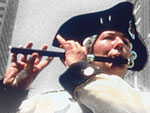Boston National Historical Park [MA]
The Boston National Historical Park interprets the pre- and early Revolutionary War history of the Boston area, as well as U.S. Navy history. Many of the sites at which rangers conduct programs are located along the Freedom Trail, which possesses a separate entry in this directory. Collections include more than 70,000 photographs and negatives, 13,000 architectural drawings, and shipyard records.
Between mid-April and November, the park offers 90-minute tours of the downtown portion of Boston's Freedom Trail. Lectures are offered at Faneuil Hall and the Bunker Hill Monument. Tours are offered of the World War II and Cold War destroyer, the USS Cassin Young. The park also offers a Freedom Trail slide show, exhibits, a 10 minute Naval Yard introductory video, Junior Ranger activities, 13 educational programs for students with pre-visit materials, and teacher workshops. The website offers a virtual tour of the USS Cassin Young, videos of Navy Yard structures which are not publicly accessible, suggested reading lists for students and teachers, and Web Ranger activities. The USS Cassin Young is not wheelchair accessible.
